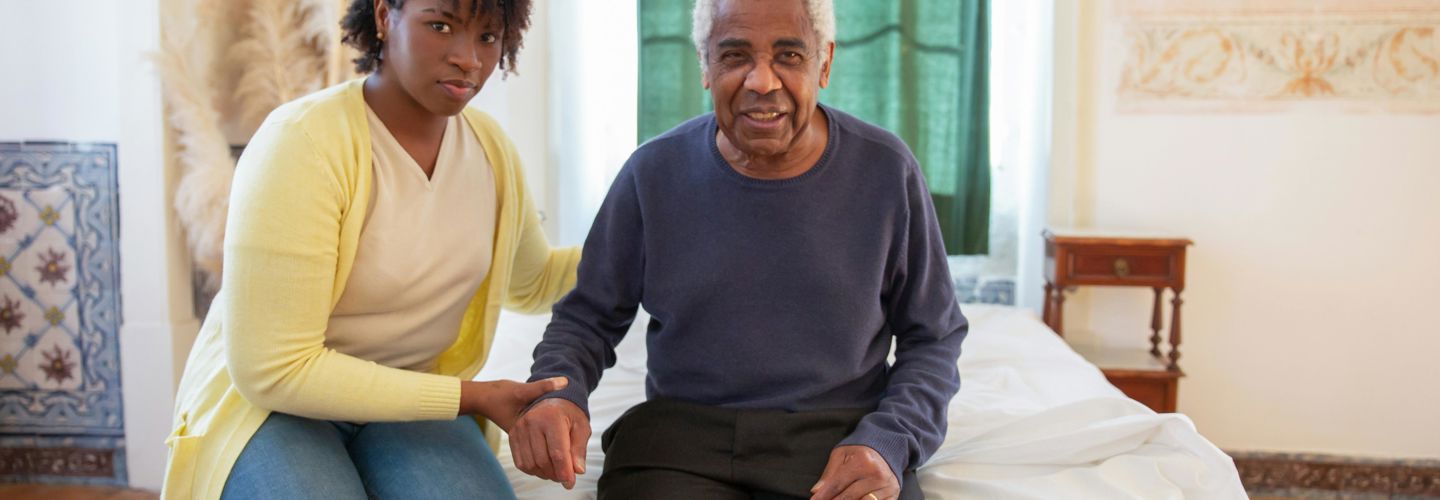
Top tips for caring for the elderly - encouraging independence
Published: 13/12/2024
After the recent success of our Top Tips for Caring for the Elderly blog, we’re sharing more top tips from our expert CareGivers, where we go into more detail about caring for the elderly.
We hope these blogs will be hugely beneficial for anyone at home who might have elderly loved-ones they are looking after.
Independence in the elderly
Losing independence is a common worry people have as they age and it can significantly affect a person’s self-worth and identity. Many elderly people take a sense of pride in being able to care for themselves and manage their own lives, so when they realise they can no longer do everything they once did for themselves, it can lead to frustration and denial and they often become resistant to accepting help.
If you’re caring for an elderly person, it’s important to try and find the right balance between them having independence and receiving help. It can be a delicate transition, but it’s important to acknowledge their feelings and encourage open conversations about how they feel and the changes and challenges they face.
Focus on the abilities they do still have instead of focusing on what they can no longer do - this helps reinforce their confidence and maintain that sense of self control.
Here are some helpful ways you can help encourage independence in elderly people:
Encourage physical activity
We all know that regular exercise is good for us, so where you can, encourage staying physically active in order to help maintain independence. Exercise helps improve balance, strength and flexibility and makes daily tasks easier. Walking, swimming or even chair exercises can boost mobility and help reduce the risk of falls. Many forms of exercise can be easily adapted for any level of physical ability, so reduced mobility needn’t be an issue.
Involvement in daily tasks
To help foster a sense of achievement, encourage the elderly person you’re caring for to get involved where they can in daily tasks such as cooking, cleaning and even dressing themselves. It doesn’t matter if they need some assistance, finding small ways for them to contribute enhances their self esteem and keeps them engaged in their daily routine.
You can break tasks down into smaller chunks, such as setting a table or folding laundry, while you or a CareGiver manage the bigger tasks.
Adapt the home if needed
There are some small changes that can be made to an elderly person’s home environment to help them maintain their independence.
Grab bars in the bathroom, non-slip mats and rails where there are steps are just some simple installations that can be made to make the home safer and reduce the need for constant assistance. Simple changes like removing rugs from the floor and ensuring floor space is clear of any wires or clutter can help to reduce the risk of trips or falls, which helps give you both peace of mind and installing motion-sensored lighting can help when it comes to moving around the home.
It might even be worth investing in riser-recliner seating or a specialist bed to help save the elderly person from having to lower themselves into a chair or get themselves up.
Socialise regularly
In 2016/17, 1.36 million people aged 50 and over in England were often lonely, and this is projected to increase to 2.03 million by 2025/26.
Maintaining a social life is crucial for an elderly person’s wellbeing, so it’s important they remain members of social clubs and groups and get out and about in their local community. Regular social interaction helps boost their mood and reinforces a sense of belonging and independence - from an exercise class to meeting a friend for a coffee, it all helps improve mental wellbeing and reduce the risk of loneliness.
Offer choice
It’s important not to take the right of choice away from an elderly person. Make sure they are able to make their own choices and decisions wherever possible, whether it’s choosing what to wear, what to eat or where to go. You can present options to them in a manageable way, so ask whether they’d like to go for a walk in the morning or the afternoon rather than overwhelming them with too many options.
Respecting boundaries
Ultimately, when caring for an elderly person, it’s important to respect their boundaries. Pushing too hard for them to accept assistance can make them feel like they’re losing control, so allow them to decide when and how to accept help and be patient as they adjust to this new normal.
Growing older comes with lots of new challenges, so if we can help those we care for regain some control in some aspects of their life, then we’re all for it. We can’t stress just how important independence is when it comes to living a fulfilling life where dignity and self worth remains intact.
We hope these tips inspire you to support the elderly person in your care with compassion and understanding, but of course, if you need help, we are always here. Head to our Contact Us page, to find out more.
